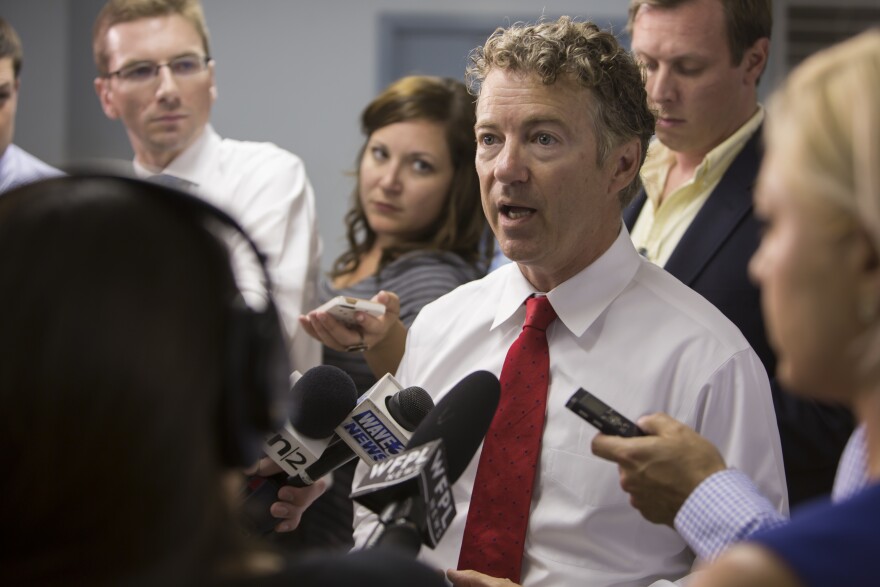Rand Paul’s presidential campaign is still not gaining speed.
At this point, it’s a running theme.
Last week, Paul barely made it on to the main stage(again) for the Republican presidential debate, and many pundits are expecting Paul to drop out of the race any day now.
One of Paul's top aides recently dismissed claims that the campaign was crumbling. The campaign staffer told Politico that the junior senator from Kentucky is still drawing big crowds on the stump.
“The first deathwatch story was written in June, and we’ve outlasted several candidates who’ve dropped out, and we continue to survive," the unnamed campaign aide told Politico.
But with Paul continuously polling near the bottom of a packed Republican field, questions linger about why he hasn’t ended his White House bid and switched gears to focus on running for re-election to the U.S. Senate next year. After all, the GOP needs to retain Senate seats to maintain the majority they won last year.
But political watchers in Kentucky say Paul has reasons to keep up his national campaign.
Winning Isn't Everything
Like his dad, Ron Paul, Rand Paul’s campaign is about ideas, said Stephen Voss, a political science professor at the University of Kentucky.
“Not every politician is out there to win. Sometimes they are out there to spread a message that they believe in, and the Paul family seems to fit that description,” he said.
Voss said Paul’s function in this race is to be a different voice in the Republican Party.
“Rand Paul’s claim to fame was always being the Republican that was outside of the box,” Voss said.
That's materialized on issues such as national security and civil liberties, on which Paul has distinguished himself with his reluctance for military intervention in the Middle East and opposition to the Patriot Act.
The problem for Paul, said Voss, is that Donald Trump takes that surprise factor out of the race, which has made Paul's novelty not so novel.
As Dewey Clayton, a political science professor at the University of Louisville, put it, “it’s not the right environment” for Paul to thrive.
Senate Seat Unchallenged -- So Far
Until recently, there were signs Paul might have to start focusing on his re-election to the U.S. Senate next year.
Earlier this year, political watchers widely expected outgoing state Auditor Adam Edelen to run against Paul. The Democrat was thought to be a viable challenger against Paul, but he unexpectedly lost his own re-election this year to Republican Mike Harmon. Edelen's loss neutralized the biggest threat to Paul’s seat.
Big wins for Republicans in other state offices also showed that Republicans, in general, are in a good position for any statewide race next year.
“Now that we just saw this surprise victory by Matt Bevin in the Kentucky gubernatorial race, I would think that gave him and supporters a lot more confidence that staying in the presidential race is not going to be harmful,” Voss said.
Voss also said staying in a national spotlight only helps Paul with his Senate campaign at this point, as long as he doesn’t “shoot himself in the foot.”
As of now, Paul doesn’t have any high-profile challengers for his Senate seat next year.
Setting Up For Later
Voss and Clayton said while it is early in the race, it seems unlikely Paul will become a frontrunner for the Republican nomination.
But Clayton said Paul’s persistence in getting his message out there despite his waning support in the polls might help him in the future.
“I think that message that he is putting forward might continue to resonate, and I think he might start trying to set a good foundation for a future run,” Clayton said.
There's a precedent for second-try success: The last two Republican nominees, Mitt Romney and John McCain, had previously run for president and lost.
Clayton said Paul is at least getting some media attention, and he still has national support.
No Big Gaffes
Unlike other candidates, Clayton said, Paul hasn’t had any scandals or obvious missteps in his presidential campaign.
Paul hasn’t gotten the kind of negative attention that frontrunners Ben Carson and Donald Trump have experienced. Clayton also said no one has claimed Paul performed badly in any of the televised debates, which are all things that could lead to an early exit.
“I think he is comporting himself quite well considering where he is in the polls,” Clayton said.
He's Invested in Kentucky's Caucus
Another factor keeping Paul’s presidential campaign alive could be that the campaign — which doesn’t have a stellar fundraising record or an endless supply of cash — has already started paying for Kentucky’s presidential caucus on March 5.
In years past, Kentucky Republicans cast ballots for the nomination in the primary in May. The caucus is happening at Paul's request, and he's financing it. The caucus lets Paul run for the Senate next year while also getting home-state support during the presidential primary season. Kentucky law prohibits candidates from appearing twice on a ballot.
Paul has already filed to run in the Kentucky caucus, which means he is financially tied to his presidential run at least through the weekend after Super Tuesday.
Also, planning a caucus is a serious undertaking for the Republican Party of Kentucky. It would look bad for Paul to bow out of the race before participating in an event that was at least partially created for his benefit.






